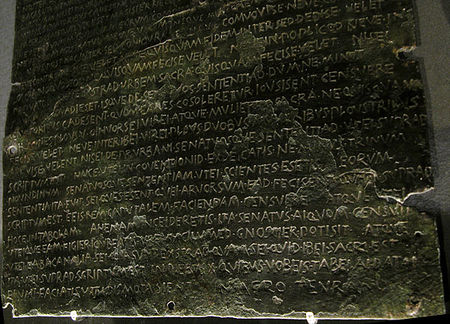Senatus consultum
From NovaRoma
(Difference between revisions)
m |
(more text) |
||
| Line 1: | Line 1: | ||
| − | [[Image:SC_De_Bacchanalibus.jpg|right|thumb| | + | {{LanguageBar|Senatus consultum}} |
| + | [[Image:SC_De_Bacchanalibus.jpg|right|thumb|450px|This inscription on bronze tablet records the ''Senatus Consultum de Bacchanalibus'', which prohibited the celebration of ''Bacchanalia'', rites in honor of the god [[Bacchus]], throughout Italy, 186 BCE. | ||
Vienna, Kunsthistorisches Museum.]] | Vienna, Kunsthistorisches Museum.]] | ||
| − | Decree of the [[senate]]. | + | Decree of the [[senate]]. A '''''senatus consultum''''' was an official statement and advice of the [[Roman senate]] to the executive [[magistrates]]. Though it was officially an "advice" from the senate to a magistrate, and technically these decrees did not have to be obeyed, in practice, they usually were. If a ''senatus consultum'' conflicted with a [[Roman laws|law]] that has been passed by the [[comitia]], the law overrided the ''senatus consultum'', because the ''senatus consultum'' had its authority based in precedent, and not in law. A ''senatus consultum'', however, could serve to interpret a law. |
| + | |||
[[Category:Law and politics]] | [[Category:Law and politics]] | ||
Revision as of 11:24, 28 March 2009
Home| Latíné | Deutsch | Español | Français | Italiano | Magyar | Português | Română | Русский | English

This inscription on bronze tablet records the Senatus Consultum de Bacchanalibus, which prohibited the celebration of Bacchanalia, rites in honor of the god Bacchus, throughout Italy, 186 BCE. Vienna, Kunsthistorisches Museum.
Decree of the senate. A senatus consultum was an official statement and advice of the Roman senate to the executive magistrates. Though it was officially an "advice" from the senate to a magistrate, and technically these decrees did not have to be obeyed, in practice, they usually were. If a senatus consultum conflicted with a law that has been passed by the comitia, the law overrided the senatus consultum, because the senatus consultum had its authority based in precedent, and not in law. A senatus consultum, however, could serve to interpret a law.